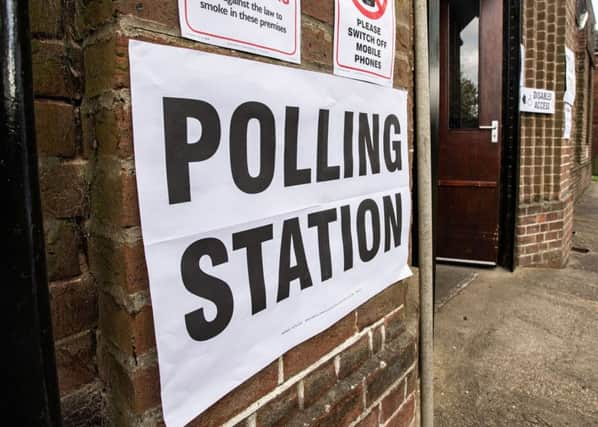EU Elections: Guide for this week’s European Elections


Just three weeks after entering polling booths to elect local councillors, people will now be asked to vote for their members of European Parliament.
The government had hoped that the Brexit deal would have been agreed by this point, and the election would not be necessary.
Advertisement
Hide AdAdvertisement
Hide AdBut now the UK will go back to the polls, with Brexit the key campaign issue for campaigners.
The EU parliament is a directly-elected governmental body of 751 members from across each member state of the European Union.
The UK has 73 MEPs in total, with five of those elected representing the East Midlands, including Lincolnshire.
MEPs in England are elected by a system of proportional representation.
Advertisement
Hide AdAdvertisement
Hide AdAhead of polling day, here is your guide to the EU elections.
What time do the polls open?
Polling booths will open 7am on Thursday, May 23 and will close at 10pm.
If you are registered to vote, you will have received a polling card with the location of your polling station.
You do not need to take your card with you to vote.
How are votes worked out?
Voters put an x by any party or independent candidate they wish to vote for.
Advertisement
Hide AdAdvertisement
Hide AdCandidates are ranked by their parties from highest priority to lowest.
The seats go, in turn, to the party which receives the highest votes.
However, as each subsequent seat is allocated the winning party gets its total votes divided by the number of seats they have won plus one.
Where and when will I find out the results?
Across Greater Lincolnshire, counts will take place on Sunday, May 26.
Advertisement
Hide AdAdvertisement
Hide AdThe result from Lincolnshire’s count will then be collated in Kettering.
An overall result for the East Midlands is expected after 10pm on Sunday.
What are the issues?
Brexit has been the dominant issue during the election campaign.
After MPs failed to pass a Brexit deal in the House of Commons, parties have set their stall out on how they would deal with the EU.
Advertisement
Hide AdAdvertisement
Hide AdThe Liberal Democrats, Change UK and the Greens have all campaigned as remain parties.
Meanwhile, UKIP, The Brexit Party and the Independent Network have called for the UK to leave the EU.
The Conservatives have campaigned on Prime Minister Theresa May’s deal, while Labour believe there should be a “close and cooperative” relationship with Europe.
The campaign trail has been all the rage with division and, in some cases, conflict.
Advertisement
Hide AdAdvertisement
Hide AdAs part of a tour across the country, The Brexit Party held a rally at Lincolnshire Showground for supporters.
Its leader, Nigel Farage, has also been seen with supporters prior to the events, but has not always had a good welcome. In Newcastle yesterday, Mr Farage was hit by a milkshake and was subsequently whisked away by his security.
On the opposite side of the Brexit debate, the Liberal Democrats called out the Brexit Party’s lead candidate, Annunziata Rees-Mogg, to a public debate.
The party has led on a “Stop Brexit” manifesto and campaigned on an “alternative message” for Brexit in Lincolnshire and the East Midlands.
Who is standing?
Advertisement
Hide AdAdvertisement
Hide AdBelow is the list of candidates in party list order for the East Midlands:
Change UK
Kate Godfrey
Joan Pons Laplana
Narinder Sharma
Pankajkumar Gulab
Emma Manley
Conservative
Emma McClarkin
Rupert Matthews
Tony Harper
Brendan Clarke-Smith
Thomas Randall
Green
Kat Boettge
Gerhard Lohmann-Bond
Liam McClelland
Daniel Wimberley
Simon Tooke
Independent Network
Nick Byatt
Marianne Overton
Daniel Simpson
Pearl Clarke
Nikki Dillon
Labour
Rory Palmer
Leonie Mathers
Tony Tinley
Nicolle Ndiweni
Gary Godden
Liberal Democrats
Bill Newton Dunn
Michael Mullaney
Lucy Care
Suzanna Austin
Caroline Kenyon
The Brexit Party
Annunziata Rees-Mogg
Jonathan Bullock
Matthew Patten
Tracy Knowles
Anna Bailey
UKIP
Alan Graves
Marietta King
Anil Bhatti
Fran Loi
John Evans
Independent
Simon Rood